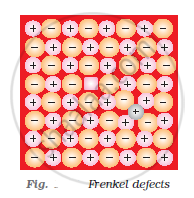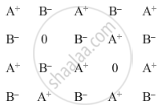Advertisements
Advertisements
प्रश्न
Explain the following terms with suitable examples: Frenkel defect
उत्तर
Frenkel defect: Ionic solids containing large differences in the sizes of ions show this type of defect. When the smaller ion (usually cation) is dislocated from its normal site to an interstitial site, Frenkel defect is created. It creates a vacancy defect as well as an interstitial defect. Frenkel defect is also known as dislocation defect. Ionic solids such as AgCl, AgBr, AgI, and ZnS show this type of defect.

APPEARS IN
संबंधित प्रश्न
Explain the following terms with suitable examples : Interstitials
Give reasons : In stoichiometric defects, NaCl exhibits Schottky defect and not Frenkel defect.
Examine the given defective crystal:

Answer the following questions :
(i) What type of stoichiometric defect is shown by the crystal?
(ii) How is the density of the crystal affected by this defect?
(iii) What type of ionic substances show such defect?
What type of defect is shown by NaCl in
stoichiometric defects, and
non-stoichiometric defects?
Frenkel defects are not found in alkali metal halides because ____________.
Type of stoichiometric defect shown by ZnS is ____________.
Type of stoichiometric defect shown by AgBr is ____________.
Which is not correct about the Schottky defects?
Silver halides generally show:
What is the effect of Frenkel defect on the density of ionic solids?
Cations are present in the interstitial sites in ______.
Match the defects given in Column I with the statements in given Column II.
| Column I | Column II |
| (i) Simple vacancy defect | (a) shown by non-ionic solids and increases density of the solid. |
| (ii) Simple interstitial defect | (b) shown by ionic solids and decreases density of the solid. |
| (iii) Frenkel defect | (c) shown by non ionic solids and density of the solid decreases. |
| (iv) Schottky defect | (d) shown by ionic solids and density of the solid remains the same. |
If NaCl is doped with 10–4 mole percent of SrCl2 the concentration of cation vacancies will be
The incorrect statement about the imperfections in solids is ______.
